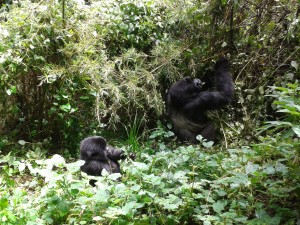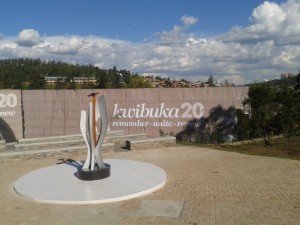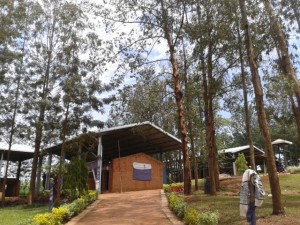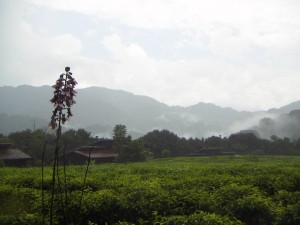In this post, Rob Coates, a former student on the MA Francophone Africa programme, recalls his recent trip to Rwanda, where he spent three months working at the Commission Nationale de Lutte Contre le Génocide (CNLG) in Kigali. Rob recently submitted his MA Francophone Africa dissertation on commemoration, textbooks and music as means of post-genocide reconciliation in Rwanda.
My first impressions of Rwanda are a bit blurred. My flight out had been disrupted by, of all things, a leaking toilet and so, when finally I touched down in Kigali, I was only capable of forming simple greeting sentences, and watching the whirl of colour fly past the car window. Luckily, by the time I met Damas, the guy I would be working with at the National Commission for the Fight against Genocide (CNLG), I had been able to sleep and came across much better for it. For the remaining three months in Kigali, I would develop enough memories to compensate for the addlement and confusion of the first few days.
 Gorillas
Gorillas
Damas runs, almost singlehandedly, the Research and Documentation Centre at CNLG, responsible for carrying out local research projects and ensuring that Rwanda safeguards written and recorded proofs relating to the genocide against the Tutsi. There is a team of Rwandan scholars under him and a complex bureaucracy above. As an intern, I was there to lend a hand in whatever capacity required. This led to an incredibly varied workload: one week I’d be preparing documents for a conference in South Africa, the next I’d research a certain subject for inclusion in a draft paper, the week after I’d have to draft a speech for commemoration. The building itself deserves a mention: in heavy rains – and oh how it can rain – the ceiling leaked; on sunny days, eagles skittered across the roof. Every morning I would entertain the guards with my enthusiastic but rubbish Kinyarwanda.
 The kwibuka flame
The kwibuka flame
Beyond the job at CNLG, I had gone to Rwanda to conduct at least some measure of personal research to allow me to write my dissertation. Early ideas – i.e. everything I had thought about before flying out – had fluctuated and changed on an almost weekly basis to the (well-disguised) despair of lecturers and tutors. Once in the country, my dissertation found its feet. As a staff member for CNLG, I was shown round the Gacaca archives, the memorials at Murambi, Nyamata and Ntarama, and attended Kwibuka ceremonies in Kigali, Rubavu and at the British High Commission. Talks in clubs, bars, shops and on the hostel veranda introduced me to the Rwandan music scene, which plays a large part in everyday life, especially during commemoration. Finally, Damas, who is an expert on school textbooks and educational practice, allowed me to analyse a series of newly published history manuals to go in a book chapter we were writing. These three facets of post-genocide Rwandan life formed the basis of my new-look dissertation, which I still haven’t heard anything about yet. I’m just assuming that no news is good news.
 The memorial at Ntarama
The memorial at Ntarama
It is impossible to spend three months in a country without being affected by its people, its landscapes and its culture. Rwanda is an astonishing place and I left richer in memory and experience than I had arrived: during my stay, I was inevitably followed by the cry of mzungu, which can be sinister if it is the middle of the night and you are a little the worse for wear, or endearing if it is piped by a chorus of children in school uniforms. Every twist of the road brought a new vista, each turn more spectacular than the last, banana trees in wild profusion and goats pegged on the verges. I broke a woman’s heart, nearly died on a moto-taxi, got acknowledged in a book and ran out of the way of a charging gorilla. Throughout, there were times when you cannot imagine anything bad ever having happened here. There were also moments when the past could not be ignored, where you were personally confronted with the horror. And so I left Rwanda and its people one sunny day in April, with a solemn promise: I will always remember. Reading this blog post, I can only hope that you remember too.
 Tea plantations and mountains in the mist
Tea plantations and mountains in the mist
